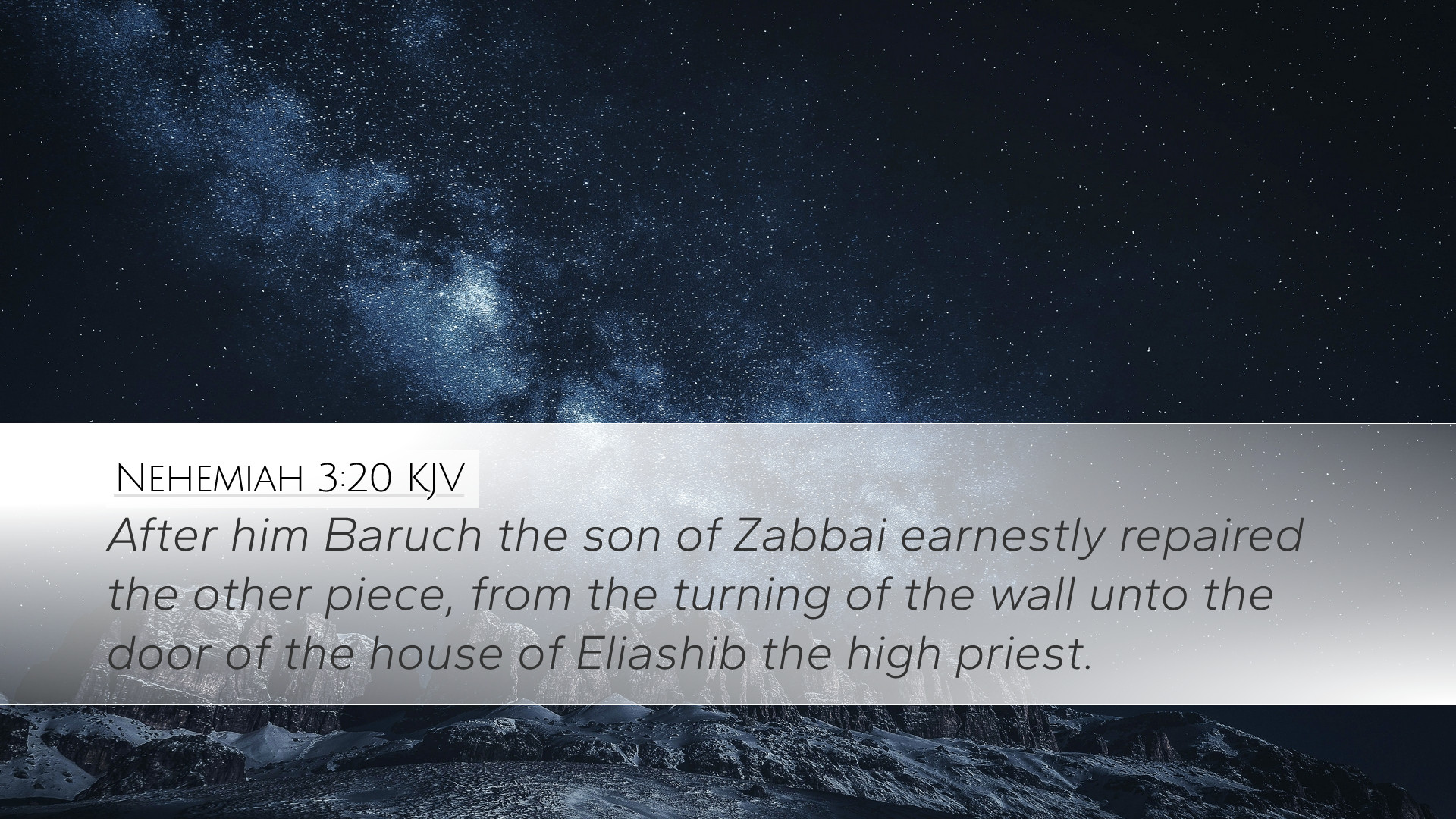Commentary on Nehemiah 3:20
Text of Nehemiah 3:20 (KJV): "After him Baruch the son of Zabbai earnestly repaired the other piece, from the turning of the wall unto the door of the house of Eliashib the high priest."
Introduction
The verse Nehemiah 3:20 is part of a larger narrative in the book of Nehemiah that recounts the rebuilding of the walls of Jerusalem. This verse highlights the dedicated efforts of Baruch, the son of Zabbai, in contributing to this important task. In this commentary, we will explore the significance of Baruch's actions, the context of the rebuilding project, and various insights from respected theologians and commentaries.
Contextual Background
The book of Nehemiah is set in the post-exilic period when the Jewish people were returning to Jerusalem after years of Babylonian captivity. Nehemiah, serving as a cupbearer to the king, was called by God to lead the effort in rebuilding Jerusalem's walls, which were in ruins, symbolizing the spiritual and communal restoration of the Jewish people.
In-depth Analysis of Nehemiah 3:20
Baruch's Zeal: Baruch's earnest repair of the wall demonstrates his commitment and zeal for the restoration of Jerusalem. As noted by Matthew Henry, Baruch’s work serves as an example of how individuals can contribute to collective goals through diligent service. His actions underline the principle that everyone has a role to play in the work of God.
Symbolism of the Work: The act of repairing the wall is loaded with symbolic meaning. In biblical theology, walls often represent safety, identity, and moral boundaries. According to Albert Barnes, Baruch's repair from "the turning of the wall unto the door of the house of Eliashib" signifies both physical restoration and the reestablishment of spiritual integrity. The connection to Eliashib, the high priest, illustrates the intertwining of civic and sacred responsibilities.
Theological Implications
Unity in Purpose: This narrative highlights the immense cooperation exhibited by the community under Nehemiah’s leadership. Each worker, including Baruch, had a specific task. Adam Clarke emphasizes that this cooperation is reflective of the body of Christ in the New Testament, where each member plays a vital role in the function and health of the church.
- Application for the Church: Just as Baruch worked earnestly in the face of great challenges, contemporary believers are called to work together for the advancement of God’s kingdom.
- Spiritual Restoration: The rebuilding effort is symbolic of personal and communal restoration that comes from a genuine relationship with God, paralleling the redemptive work accomplished through Christ.
Baruch’s Character and Example
Baruch represents the kind of dedication that is essential in any undertaking for God. His commitment is noted not just in the action but in the attitude he brings to the work. Matthew Henry points out that Baruch's “earnestness” is crucial; it conveys a sense of urgency and determination. Every pastor, student, and theologian can draw from Baruch’s example in their ministry and studies.
Prayerful Reflection
As one reflects on Nehemiah 3:20, it is imperative to consider how one can contribute earnestly to the mission of God in their own context. A prayer for diligence and commitment in spiritual and communal tasks is appropriate:
Prayer: "Lord, grant us the diligence of Baruch as we work to build your kingdom. May our efforts reflect our love for You and our commitment to our communities. Help us to collaborate as a unified body, each fulfilling our roles to contribute to the overall mission that You have laid before us."
Conclusion
Nehemiah 3:20 is more than a historical account; it is a rich source of practical and theological insights. Through the character of Baruch, we see examples of zeal, commitment, and community in action, all crucial components of fulfilling God’s mission. For pastors, students, and scholars, this verse serves as a reminder of the importance of working earnestly in unison to repair not just physical structures, but the spiritual lives of individuals and communities.


